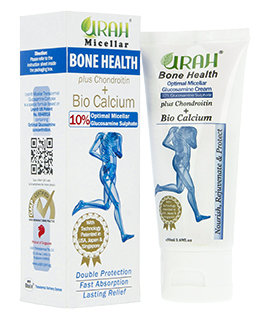
Dr Ronald Zernicke, director of the University of Michigan Bone and Joint Injury Prevention ad Rehabilitation Center, and his colleagues recently published results of their review of 50 years of research on diet's role in healthy skeletal tissue and overall bone health. The findings, published in Sports Health: A Multidisciplinary Approach, supports current facts about bone health and prevention of bone loss, and validates nutritional strategies to preserve musculoskeletal structure and strength for every person, regardless of age.Dr Zernicke summarized the group's findings by saying, "Adequate nutrition is critical to the development and maintenance of a healthy skeleton. It's important for everyone -- young and old, people who participate in sport and recreational activities, and everyone in between -- to make dietary choices that provide the foundation for overall bone health and physical performance."The researchers looked specifically at the roles of dietary protein, fat and carbohydrates on bone and joint health. Based on the research, they recommend the following nutritional strategies.
Historically, there has been debate about the effects of dietary protein on bone health. Some early research suggests that high-protein diets — particularly diets high in red meat — can cause weak bones. But more recent studies indicate that high-protein diets can increase bone mineral content and decrease the risk of fractures. Dietary protein helps build and maintain muscle, which protects joints and bones, and even stimulates bone strength (when accompanied with weight-bearing activities). The researchers also found that high-protein diets often are recommended for adolescent and child athletes undergoing rigorous training. Dr Zernicke's team recommends high-quality animal protein (eggs, salmon, lean meats) and plant-based protein (soy, beans, legumes).The truth about protein in the diet
The effects of diets high in refined sugar on bone health have been studied extensively and have shown that high-sugar diets impair bone growth and mechanical strength. In particular, diets high in carbonated beverages, such as soft drinks and even sports drinks, are associated with significant decreases in bone mineral density -- in both males and females. Dr Zernicke says that some of these detrimental effects are due to the decreased consumption of milk and other available fluids in favor of soft drinks. Further, drinking soft drinks can also lead to weight gain and a decrease in lean muscle mass, and can contribute to the loss of calcium and iron, which are crucial to health and athletic performance. Dr Zernicke says, "While it's vitally important to hydrate during any type of sport or physical activity, it might be worthwhile to drink bottled or tap water, milk, orange juice or drinks fortified with calcium instead of reaching for a sugar-filled sports drink."Benefits of drinking milk
Not all carbohydrates have a negative impact on bone and joint health. Complex carbohydrates, such as fruits and vegetables, may actually improve bone mass density and increase calcium absorption. According to Dr Zernicke, fruits and vegetables contain non-digestible carbohydrates, like inulin-type fructans, that cannot be digested by the small intestine. As they move toward the large intestine and begin to be processed, they produce organic acids that enhance the disbursement of calcium throughout the body. In addition, fruits and vegetables contain antioxidants, vitamins, minerals, fiber and other phytonutrients that are essential for overall health. They are also low in calories compared to other foods, which can help ward off the weight gain that can cause musculoskeletal problems.20 superfoods for super health
Calcium, the most abundant mineral in the body, is one of the most important nutrients for bone health. The mineral also plays an essential role in muscle contraction, heartbeat regulation, nerve impulse transmission, regulation of blood pressure and immune system function. Getting the recommended daily intake of calcium (which varies by gender and age) can help ward off osteoporosis and keep your muscles and nerves properly functioning. Dr Zernicke says getting the adequate daily dose of calcium can be as simple as eating dairy products like cheese, milk and yogurt, as well as plant-based foods such as kale, turnip greens, broccoli, tofu and calcium-fortified foods like orange juice.Recommended daily intake for calcium
Vitamin D, also known as the sunshine vitamin because your body manufactures its own vitamin D with sun exposure, is key in helping your bones absorb calcium. New research also indicates that vitamin D helps boost the immune system and can help you live longer. Food sources of vitamin D include fatty fish and egg yolks as well as vitamin D-fortified foods such as cereals, orange juice, cow's milk, cheese and yogurt.Are you at risk for a vitamin D deficiency?
Dr Zernicke recommends avoiding foods and beverages with poor nutrient density (such as those high in sugars, sodium or saturated fat, as well as carbonated soft drinks) because these will leave the body and skeleton devoid of the nutrients essential for healthy development. He also suggests that if there are dietary deficiencies, supplements (such as calcium carbonate or calcium citrates, as well as multivitamins) can be used to enhance skeletal health.The right way to take supplements
Source: http://www.sheknows.com/health-and-wellness/articles/809019/tips-for-strong-bones-and-joints
Click here to Check How to Use Urah Products
Click here to Check the Quality of your Glucosamine Product before use

2026 © URAH Transdermal Pte Ltd. ALL Rights Reserved. Urah Privacy Policy | Terms of Service | Return Policy
Disclaimer: All contents on this website are provided for general information only, and should not be treated as a substitute for the medical advice of your Physician or any other health care professional. Urah is not responsible or liable for any diagnosis made by any user based on the content of this website. Always consult your own Physician if you're in any way concerned about your health. Urah Micellar Transdermal Cream formulae are not patented or under any patent rights.
No comment yet